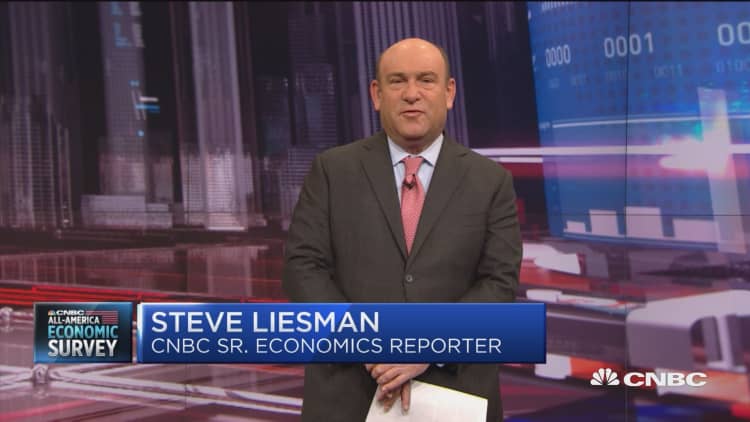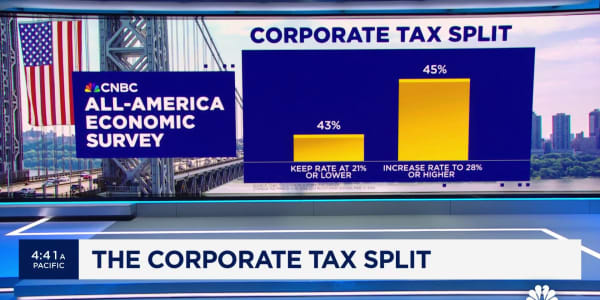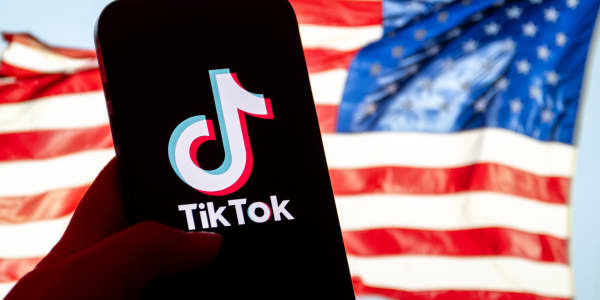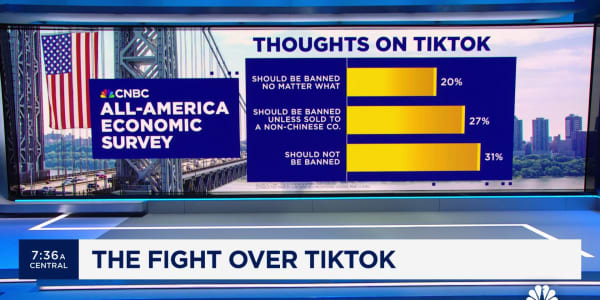
American economic optimism took a sharp turn down in the fourth quarter from record high levels, with the CNBC All-America Economic Survey registering its biggest quarterly drop in its 12-year history.
Yet the decline in optimism looks to be doing little to dissuade Americans from shopping for the holiday season. Spending plans surged to their highest level in the history of the survey, propelled by strong income and wage gains over the past year.
The percentage of Americans viewing the economy as excellent or good dropped 8 points to 50 percent. Yet that number remains well above the long-run average for the survey. Those believing the economy will improve dropped 5 points to 31 percent, bringing it back down to the long-run average. The decline wiped out a big part of the gain that ensued after President Donald Trump took office.
"This is not the trend we have been seeing,'' said Micah Roberts, partner with Public Opinion Strategies and the Republican pollster for CNBC's survey. "We are on a different trajectory than we have seen since the Trump presidency."
View on Trump
The fall in optimism reflected on Trump's economic approval, which ticked down from 51 percent in October to 48 percent in the most recent survey, while his disapproval rose to 42 percent from 38 percent.
"The president has repeatedly taken full credit for the economy's improvement, and many Americans agreed,'' said Jay Campbell, partner Hart Research Associates, the Democratic pollster for the survey. " But now he's finding that it works both ways — when Americans' financial mood darkens, it's a weight he's going to have to bear.
Trump's overall job approval rating, however, did not change compared with October. It remained at 41 percent and his disapproval fell 2 points to 47 percent. His support rose among Republicans, but dropped among Democrats and strongly among independents.
The nationwide poll of 802 Americans was conducted Dec. 3 thru 6 and has a margin of error of plus or minus 3.5 percentage points. That puts the change in the president's economic approval rating inside the margin of error.
Big spending plans
Apart from politics, Americans plan to spend with some abandon this holiday season and use a bit more debt to achieve their holiday goals. Average holiday spending plans rose above $1,100 — the first time the holiday survey has seen an average number above $1,000. The prior record was last year's average of $907. Gains were spread across income groups, but those who approve of Trump and Republicans overall showed some of the biggest increases in year-to-year spending plans.
Twenty-nine percent said they would use credit cards or other debt in their holiday spending, up from 26 percent when the question was last asked in 2016, with about a quarter of those saying they would carry that debt for longer than three months.
Why would Americans spend so much more if their outlook has darkened? The reason may have to do with stronger wage gains and employment over the past year, compared with what people expect next year. Unemployment this year hit a 50-year low of 3.7 percent. Wage gains the past two months topped 3 percent year over year for the first time since the end of the financial crisis.
Among those saying they would spend more this holiday season, 53 percent said it was because of higher income and pay. Just 9 percent said it was due to the economy being in good shape and fewer attributed their spending to tax cuts, lower gas prices and gains in the stock market. At least some of the optimism decline is connected to the recent fall-off in the stock market, although Americans generally do not tie their spending to equity gains or losses.
In addition, while optimism has fallen from record levels the prior two quarters, it remains high and about on par with last year's holiday season. The 50 percent of the public rating the economy as excellent or good ties it for the fourth highest in the survey's history. At the same time, most economists expect slower but necessarily slow growth this quarter and next year, and the survey could be picking up that cooling in growth.






